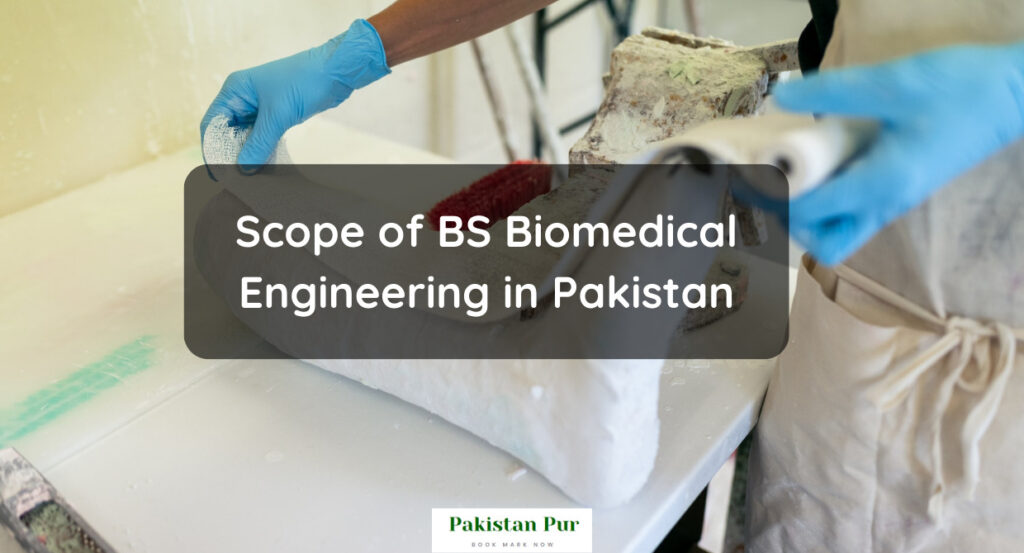
Table of Contents
The Scope of BS Biomedical Engineering in Pakistan is growing with advancement in healthcare and medical field.
Biomedical Engineering in Pakistan is a field that intertwines engineering principles with medical and biological sciences to address healthcare issues.
Despite being a relatively new discipline, it’s gaining traction with advancements in the profession. The curriculum is designed to equip students with skills to solve complex problems in medicine.
Graduates can find opportunities in various industries, primarily healthcare. This emerging field aligns engineering expertise with medical industry needs, fostering growth and development.
However, the scope of biomedical engineering in Pakistan is currently limited, with fewer job opportunities compared to other fields.
Let’s dive deeper into the biomedical engineering scope in Pakistan.
Industries for BS Biomedical Engineering Graduates
When discussing the scope of a degree program, the first thing we look at is the variety and strength of the industries that employ graduates of that degree program. It helps us understand if the degree is in high demand and if the graduates can get a competitive salary.
Here is a short list of the top industries that employ BS biomedical engineering graduates.
- Healthcare – The primary industry, Biomedical Engineers design and improve medical equipment and devices, install or repair biomedical equipment, and provide technical support.
- Pharmaceuticals – They apply their knowledge in developing drug therapies, delivery systems, and manufacturing processes.
- Medical Devices Manufacturing – Biomedical engineers play a crucial role in the design, development, testing, and production of cutting-edge medical devices.
- Research Institutions – They contribute to medical research, creating solutions for health-related issues, and advancing our understanding of biological systems.
- Biotechnology Firms – Biomedical engineers work on the application of biological organisms in technology, such as designing biocompatible prostheses.
- Government Regulatory Agencies – They ensure medical products meet legal standards and ethical considerations, ensuring patient safety.
- Hospitals – They manage and maintain medical equipment, and collaborate with healthcare professionals to optimize patient care.
- Education – Biomedical engineers can become educators, teaching the next generation of engineers in universities and colleges.
- Consulting – They provide professional advice to companies about biomedical equipment and its implementation, helping organizations make informed decisions.
- Software Development Companies – They contribute to the creation of software used for running biomedical equipment, and in developing health apps and virtual healthcare solutions.
Read this guide to know about the biomedical engineering universities in Pakistan, subjects and courses, fee structure, and admission eligibility.
Guide To BS Biomedical Engineering In Pakistan 2023
Careers for BS Biomedical Engineering Graduates
The most important thing in the scope of biomedical engineering in Pakistan is the job role that the graduates will get. Here, I have briefly mentioned the top 10 job roles that fresh BS biomedical engineering graduates can get.
- Biomaterials Developer – They design and develop materials that are compatible with the human body for medical purposes.
- Manufacturing Engineer – They are responsible for designing and developing medical products.
- Independent Consultant – They offer expert advice on the implementation and efficiency of biomedical equipment.
- Doctor – With further studies, biomedical engineers can become medical doctors, using their technical knowledge to enhance patient care.
- Clinical Engineer – They apply engineering concepts to healthcare technology in hospitals, ensuring optimal use and maintenance.
- Research Engineer – They conduct research to create innovative solutions for health-related issues.
- Product Development Engineer – They work on the design and development of new biomedical devices.
- Bioprocess Engineer – They use their skills to manage and optimize biological processes in pharmaceutical manufacturing.
- Biomechanical Engineers – They specialize in the mechanics of the human body and apply this knowledge to design aids and replacements for body parts.
- Medical Technology Developer – They create new technologies or software used in the diagnosis and treatment of diseases.
BS Biomedical Engineering Salary in Pakistan
According to data gathered from job boards such as Indeed, the average salary of biomedical engineer in Pakistan is Rs 34,519 per month.
Positions such as Bio Medical Engineer/Facility Executive offer monthly salaries ranging from Rs 40,000 to Rs 45,000. Other roles like Lath Machine Operator provide higher compensation, with salaries between Rs 80,000 and Rs 90,000 a month.
Furthermore, entry-level roles like internships and traineeships also provide valuable experience, with Trainee Engineer positions offering around Rs 27,000 a month.
However, it’s important to note that salaries can vary based on location, company size, and job responsibilities.
Further Education after BS Biomedical Engineering
While not explicitly a part of BS biomedical engineering scope in Pakistan, it is important to know your academic growth opportunities in the field. Here is a brief overview of the same;
Master’s Degree in Biomedical Engineering
This advanced degree allows professionals to delve deeper into specialized areas, such as biomaterials, biomechanics, bioinformatics, or medical imaging. It often includes a research project or thesis, offering the opportunity to contribute to the advancement of the field.
Doctorate Degree (Ph.D.) in Biomedical Engineering
A Ph.D. prepares graduates for careers in research or academia. It involves a significant research component, resulting in a dissertation that contributes new knowledge to the field.
Medical School
Some Biomedical Engineering graduates choose to apply their technical expertise in a clinical context by pursuing a medical degree. This path allows them to use their unique skill set to improve patient care.
MBA in Healthcare Management
An MBA with a focus on Healthcare Management provides the business acumen needed to lead organizations within the healthcare sector. This could include hospitals, pharmaceutical companies, or medical device manufacturers.
In conclusion, further education can enhance your knowledge, skills, and career prospects in Biomedical Engineering. The choice of pathway will depend on your interests, career goals, and commitment to lifelong learning.
Leave a Reply